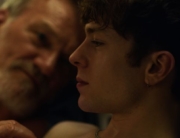A story of forbidden teenage lesbian love across class lines in Kenya, Rafiki has drawn attention as the target of an attempted ban by the Kenyan government. The African nation’s officials must be very insecure indeed to be threatened by this chaste, hopeful, and open-hearted film, whose title means “friend.” Although stating its anti-homophobic message in a very upfront way, Rafiki generously includes nuance that helps viewers understand its beleaguered characters, even those in the wrong.
The film opens with a montage of colorful Kenyan street life: scarlet vegetables being chopped, a spiky beard going under the shaver, a hula-hoop twirling around a smiling little girl. We piece together a view of a hip, androgynous figure swerving her way through the excitement on a skateboard. It’s Kena, a young woman at home in the sensory overflow but always a little deliberate, a little watchful. Samantha Mugatsia establishes Kena’s character as someone who always has to mind her step.
And no wonder. Kena is forced to negotiate a complicated gauntlet of people, all with their own agendas. A bluff male friend, Blacksta (Neville Misati), can’t hide his (unreciprocated) romantic interest. A sullen rival for Blacksta’s affections gangs up with her mother to gossip about all the drama they witness from their market stall. Kena’s own mother is bitter about being dumped by Kena’s father, who has remarried and now has another child on the way. And her father fights off guilt and is preoccupied with running for neighborhood office against a local bigwig. Kena can’t bring herself to let her guard down around anyone.
Except Ziki (Sheila Munyiva), the sexy, irrepressible daughter of her father’s political rival. Ziki’s explosion of pink and blue dreadlocks, luscious smile, and seductive dance moves catch Kena’s eye and draw her out of her emotional house arrest. The girls chat. Then they go on outings. Soon the two are raising eyebrows with stolen moments together, not least because Ziki comes from a different tribe and a distinctly tonier side of the tracks than her new crush. The community is about to come down hard on the two’s gentle, naive bond and their ambitions for a less constrained life. Surprises will lie in who holds back and who twists the knife.
Writer/director Wanuri Kahiu gives us reactionary mind-sets, violence, haughty authority, and a bigoted preacher as foils for the young women’s love to struggle against, but she widens her scope of understanding to include those who share their lives. For all his bluster, Blacksta truly cares about Kena and supports her ambitions to become a doctor, and Kena’s parents have their own sorrows and disappointments to face. Perhaps, Rafiki implies those around Kena and Ziki just need a little time to adjust. By the cautiously uplifting conclusion, it’s clear that while some bitter haters can never understand, some will come around—maybe even Kenya itself.

















Leave A Comment